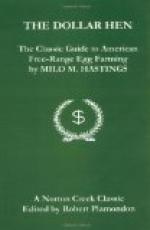An express messenger running out of St. Louis became interested in the egg trade. He arranged with a few country friends to ship him their eggs. These he candled in his house cellar and began selling them to a limited trade in the wealthy section of the city. At first he delivered the eggs himself. This was in the World’s Fair year of 1904. In 1908 he did a $100,000 worth of business and his type of business shows a much better percentage of profit than that of the ordinary type of dealer.
In Chicago, one of the large dairy companies established an egg department and placed a young man in charge of it. The eggs in this case are not bought of farmers but are secured from country produce buyers whom the Chicago company have encouraged to educate their farmers to bring in a high grade of goods. These people buy their eggs in Tennessee in the winter and in Minnesota in the summer, thus getting the best eggs the year round. They sell by wagon on regular routes. The business is growing nicely and pays good profits.
Other similar concerns are operating in Chicago and other large cities. They are not numerous, however, and there is room for more. The reason the business has not been overdone is chiefly because of the difficulty of getting sufficiently really high grade eggs in the season of scarcity. Southern winter eggs are destined to relieve this situation more and more.
Another great difficulty with a plan that attempts to buy eggs directly from the producer is that premium offered on the goods tempts the farmer to go out and buy up eggs from his neighbors. This brings disastrous results in the quality of the goods and the farmer must be dropped from the list. In order to make a success, a system of buying directly from producers must be based upon a grading scheme that will pay for the actual quality of the eggs. No fear then need be exercised as to whether the farmer sells his own eggs or those of his neighbor.
The following extract from Farmer’s Bulletin 128 of the U.S. Department of Agriculture has been used as advertising “dope” in the sale of high grade eggs:
“Under certain conditions eggs may be the cause of illness by communicating some bacterial disease or some parasite. It is possible for an egg to become infected with micro-organisms, either before it is laid or after. The shell is porous, and offers no greater resistance to micro-organisms which cause disease than it does to those which cause the egg to spoil or rot. When the infected egg is eaten raw the microorganisms, if present, are communicated to man and may cause disease. If an egg remains in a dirty nest, defiled with the micro-organisms which cause typhoid fever, carried there on the hen’s feet or feathers, it is not strange if some of these bacteria occasionally penetrate the shell and the egg thus becomes a possible source of infection. Perhaps one of the most common troubles due to bacterial infection of eggs is the more or less serious illness sometimes caused by eating those which are ‘stale.’ This often resembles ptomaine poisoning, which is caused, not by micro-organisms themselves, but by the poisonous products which they elaborate from materials on which they grow.




